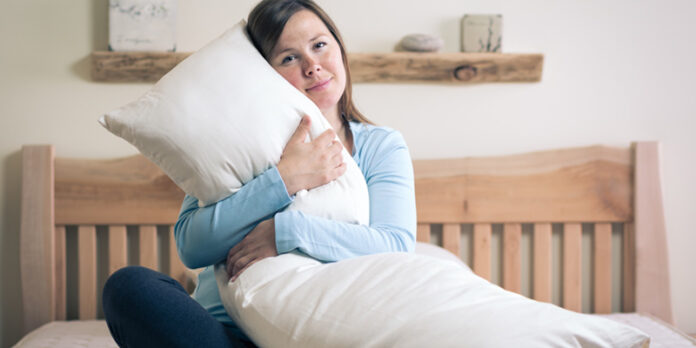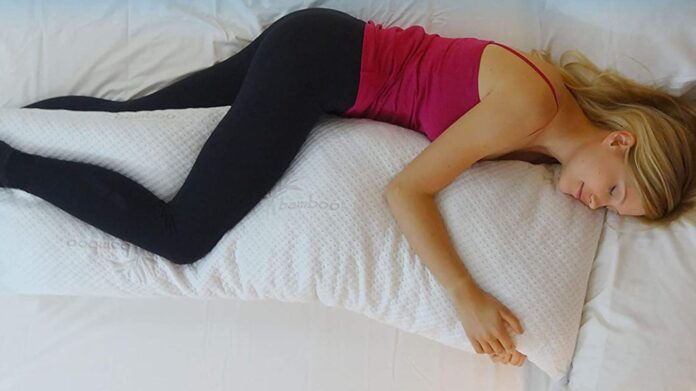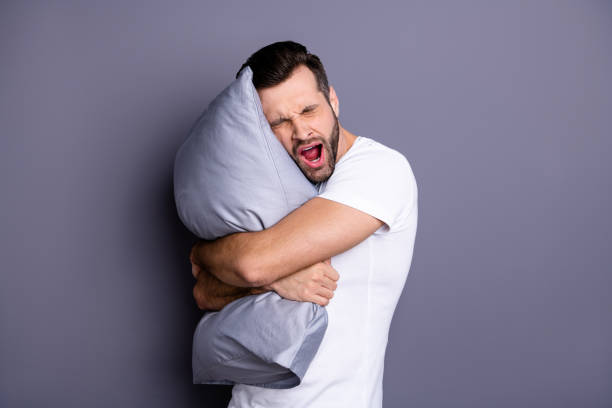Pillow-hugging: is it a sign of an individual in need of comfort or simply the result of a cold and lonely night? Have you ever found yourself embracing your pillow in search of solace or companionship? If so, you’re not alone – many people find themselves turning to their pillows as a substitute for human contact.
What is a pillow hug?

The significance of a pillow hug can vary greatly depending on the individual’s circumstances. It is the act of holding onto a pillow when sleeping or cuddling with it while awake. It is often viewed as an indicator of loneliness and a need for comfort.
In some cases, people use them to replace physical contact when they lack regular companionship or struggle with feelings of disconnection. Cuddling with a “hugging pillow” can help them cope with difficult emotions such as sadness, depression or anxiety. Additionally, hugging a soft object like a long cat plush might provide tactile reassurance, allowing someone to feel like they are being hugged or embraced even when in solitude.
The psychological reasons for hugging a pillow are personal and varied, but most commonly it is seen as seeking relief from feelings of stress, anxiousness and isolation. Therefore, if you notice this behavior in someone close to you, offering support and understanding may help them open up more easily about their difficulties and find healthier ways to cope with their emotions.
Psychological implications of pillow hugging

It is a common behavior that can have several different meanings depending on the individual’s particular circumstances and feelings. Many people attribute pillow hugging to feelings of comfort, stability, and security and often find themselves doing it as a way to express pain, fear, anxiousness, or loneliness.
Some psychologists believe that it may be a manifestation of self-soothing behavior; quelling anxious thoughts or calming inner chaos. On an emotional level, people may use it to provide the human contact they crave but cannot get from another person. For example, those who live alone or are socially isolated may hug them in an effort to fill the void left by the absence of another person’s touch.
It can also come from feelings of helplessness and depression as it reminds those individuals that they must rely on themselves for comfort in difficult times. For children who feel overwhelmed by parental demands or high expectations, they may establish an emotional connection to their pillows because it symbolizes safety and independence during difficult times with adults. Similarly, for adults experiencing anxiety or depression due to work-related stressors or family issues, it could help ease these worries temporarily.
Overall, it is a personal coping mechanism used by many people when facing challenging situations such as uncertainty about the future, lack of companionship in life’s journey, or even spiritual questioning about one’s life purpose and identity. Recognizing how our minds rely on this external source for sustaining hope is critical in understanding our own need for autonomy and stability amid tough situations.
Comforting Effects of Pillow Hugging

Although not widely researched, there are some theories about why people hug a pillow for comfort. They provide a secure and consistent form to hug, giving the sensation of being held without any potential judgment. This can help to strengthen feelings of security, self-soothing, and protection. People often seek out this type of physical comfort when feeling overwhelmed, insecure or unsafe. Cuddling it during times of distress offers warmth and firm pressure that helps to ease stress and provide grounding sensation in the body.
Likewise, while some people may seek out the soothing effects of pillowing-hugging simply because it feels nice and comforting, others may find it momentarily beneficial to calming intense emotions like anger or sadness related to traumatic experiences. Placing one’s face against the softness of it can be comforting; allowing time to take slow deep breaths before addressing what is causing distress is a positive practice in itself. In addition to this, hugging a strong object like a pillow can help diffuse some of the negative energy associated with difficult emotions.
While everyone’s comfort levels are different when it comes to physical contact – including the act of hugging – connecting with an object like pillowing-hugging has been empirically shown as therapeutic for most individuals seeking comfort in such ways. So if you’ve ever hugged it for comfort before – go ahead! There’s no shame in needing something physical as an emotional outlet; indeed it is natural as humans we look for soothing ways to handle stressful emotions or stressful moments.
Benefits of Pillow Hugging
Though it may seem like a simple thing, pillow hugging can actually provide many physical and emotional benefits. The physical benefits come in the form of increased comfort and relaxation, as well as support for the body’s natural curves. It can also provide psychological benefits, including calming anxiety and promoting a sense of security. Furthermore, research has shown that hugging a pillow can lead to improved sleep quality as it reduces night-time restlessness.
Many people enjoy the feeling of embracing a soft, cushiony pillow against their body during times of stress or feelings out of control. It’s common for people who’ve gone through a traumatic experience to gravitate towards holding their pillow tightly as an emotional coping mechanism. By providing a comforting embrace that simulates being held by another person, people may experience a sense of safety when they hug their pillow at bedtime.
In addition to these mental health benefits, regular practice of pillow hugging can help you:
- Relax your muscles
- Improve proper posture while sleeping or lying down
- Provide needed support to help relieve joint pain or stiffness
The soft properties of the pillow hug make it gentle on sensitive parts of your body while still providing enough cushioning for true comfort in any position you choose to take during restful moments throughout the day or night.
Conclusion

The meaning behind someone hugging their pillow often depends on the person and the circumstances. It could simply be a comforting gesture, indicative of homesickness or loneliness, or it could even mean that they are seeking comfort or protection from something external. It can also be a sign of sleep difficulty, such as insomnia or nightmares.
Regardless of the reason why someone is hugging their pillow, it can be important to sensitively inquire about their needs and feelings in order to help provide appropriate support.









